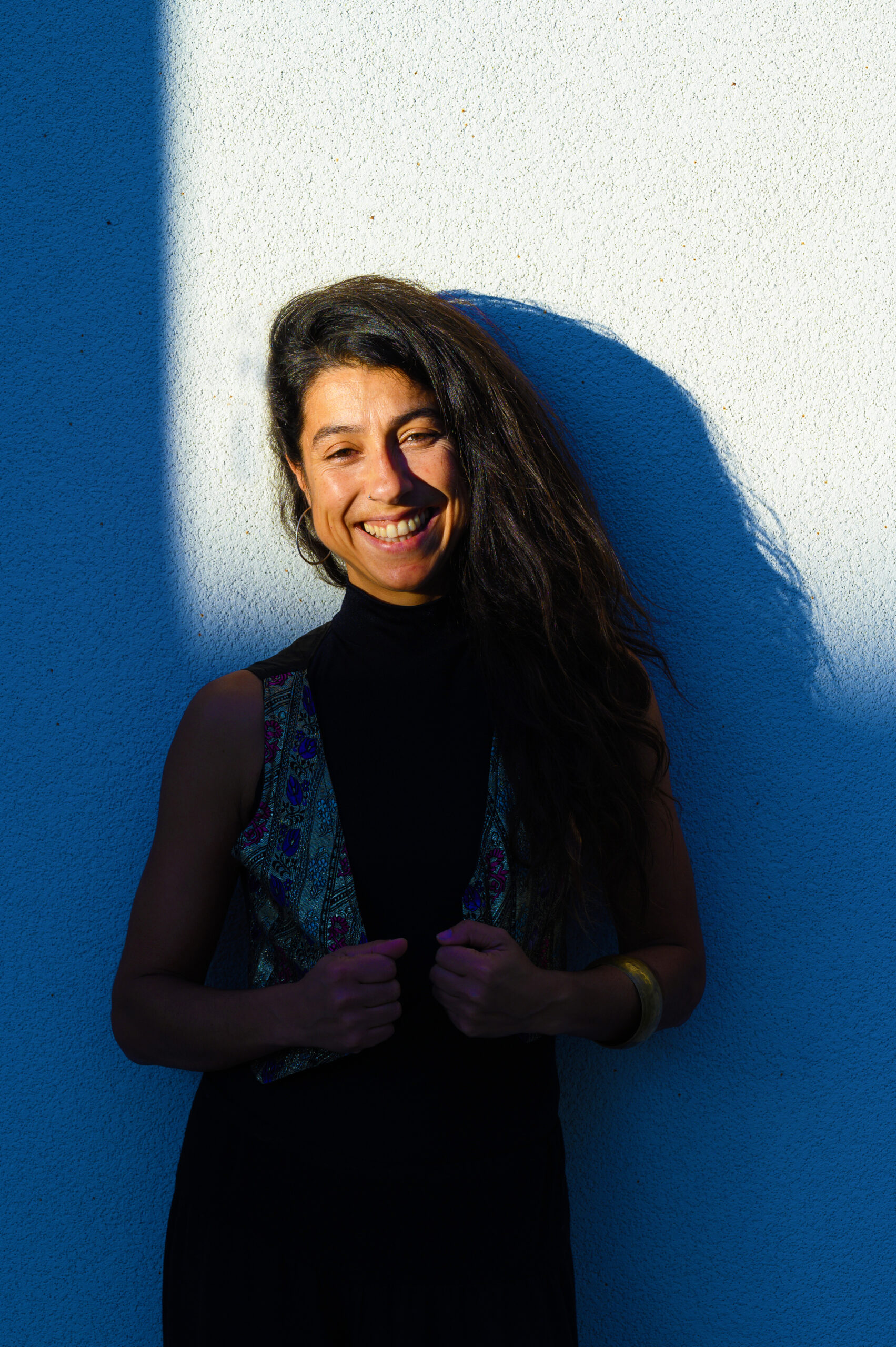
Teresa Fabiao © Jose Caldeira
Teresa Fabiao is a Portuguese dance artist and artivist. Her work is focused on art education and creative expression on the topic of living with HIV to raise public awareness.
1. There are many layers of disconnection from the body in society. Just using somatics to put people in touch with their body is already such transformational justice work. How are you integrating somatic knowledge for communities?
I’ve been releasing the technical realm of dance and embracing free dance, authentic movement and somatic practices that are connected to what is alive inside. As a creator/performer, I am exploring how I can keep the somatic flow present as I’m dancing.
In community, I’ve been researching embodied social justice. How can these tools be used for relationships? To establish healthy boundaries? To communicate better?
My artivism in HIV is first connected to women’s rights. There is so much invisibility and work to do in this intersection. When you take steps to address the stigma of HIV you’re also acknowledging all the other stigmas connected to being a woman and all the projections society places on women. All of this has to do with the body. Somatics is a way to work with that material.
I’m interested in not just women’s rights but women’s dreams. Which is connected to women’s pleasure. To manifest dreams you need the feminine and the masculine energies together.
2. How did it feel to come out with HIV at the beginning of the COVID 19 pandemic?
It felt like a big moment to revisit HIV because the world was living a collective experience of a new virus that interfered in everyone’s life. Not everyone’s experience was the same, but all were touched by it.
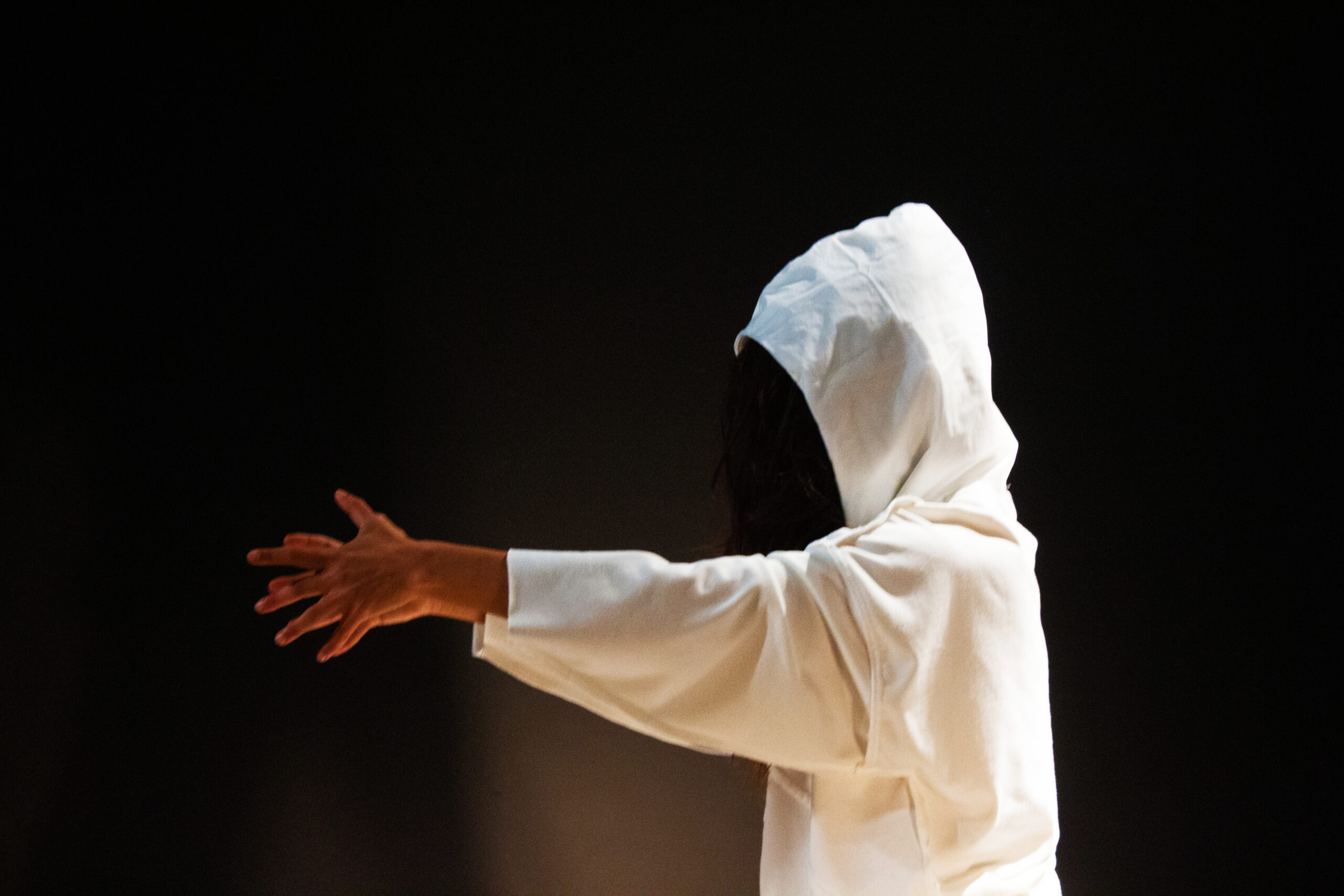
UNA dance performance
Teresa Fabiao © Luis Rosa Lopes
When COVID first started I felt calm because I had already gone through the shock that I might die from a virus. I was in the US when the pandemic broke out.
In the beginning of the pandemic I was searching for funds for this work. A friend of mine thought I was crazy. He said “people are fed up hearing about viruses.” For me it was the opposite. I was sensing that these dissident bodies of the past were now being integrated into the present because they have a knowledge that is helpful for everyone.
It felt like a strong moment for creating empathy and dialogue. For example I met a Portuguese girl on the bus in Spain. I started talking about my experience. She said at the end of the conversation that she realized it had been years since she took an HIV test and asked if I could go with her to get tested.
If I can transform the life of one person I’m already doing my job.
3. You have lived in different countries and HIV is an under discussed topic everywhere. Are there places you felt education around HIV is stronger?
Portugal is a very moralist society. It’s archaic in terms of education, speech, health, and the role of women in society. When you talk about HIV you touch into two of the biggest taboos in humanity: sex and death, since the disease is still attached to death because if you don’t take care of it it can kill you. The person who infected me died.
I feel very privileged that all three countries I lived in give the medication for free. This is not the case everywhere.
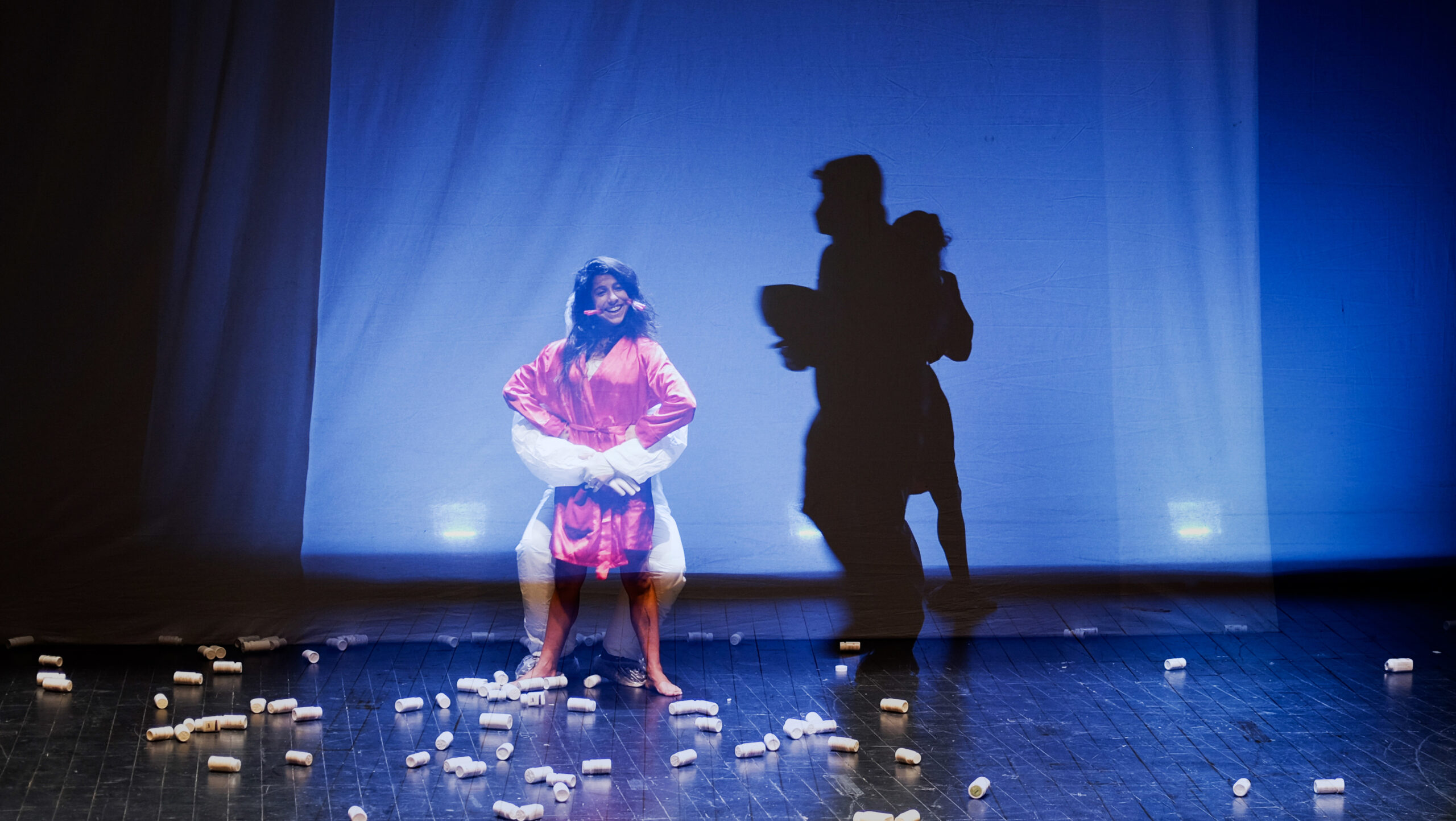
UNA dance performance
Teresa Fabiao © Maria Borges
In Brazil they are more progressive in terms of enjoying pleasure, life, sex. It is a sensual and open society. However there are many contradictions.
In the US I was in a specific part, California, near San Francisco. I did a small art/ anthropological research there on Tinder. I decided to share my status there. On the profile I put a bit about me and info about HIV. It clearly stated that a person who is taking the pills does not transmit the disease, which is known as the term “undetectable.” A shocking amount of people don’t know this is true! I was curious how the response would be. I interacted with over 100 people, it was fascinating and this research is part of the performance UNA. It gave me hope again in humanity.
Spain is still a moralist country like Portugal. What is different is there are a lot of cases of HIV and many who died. Unlike Portugal, Spain went through a sexual revolution in the 80s/90s. So when HIV started it was during the “Almodovar generation”; sex, drugs, rock and roll. The founder of the NGO I worked with is a survivor for 30 years. Many in her community passed away. In a moment where this is no longer a death sentence for us, I feel the need to give back to everyone, especially the elders.
4. What has been your approach to activism through the topic of HIV?
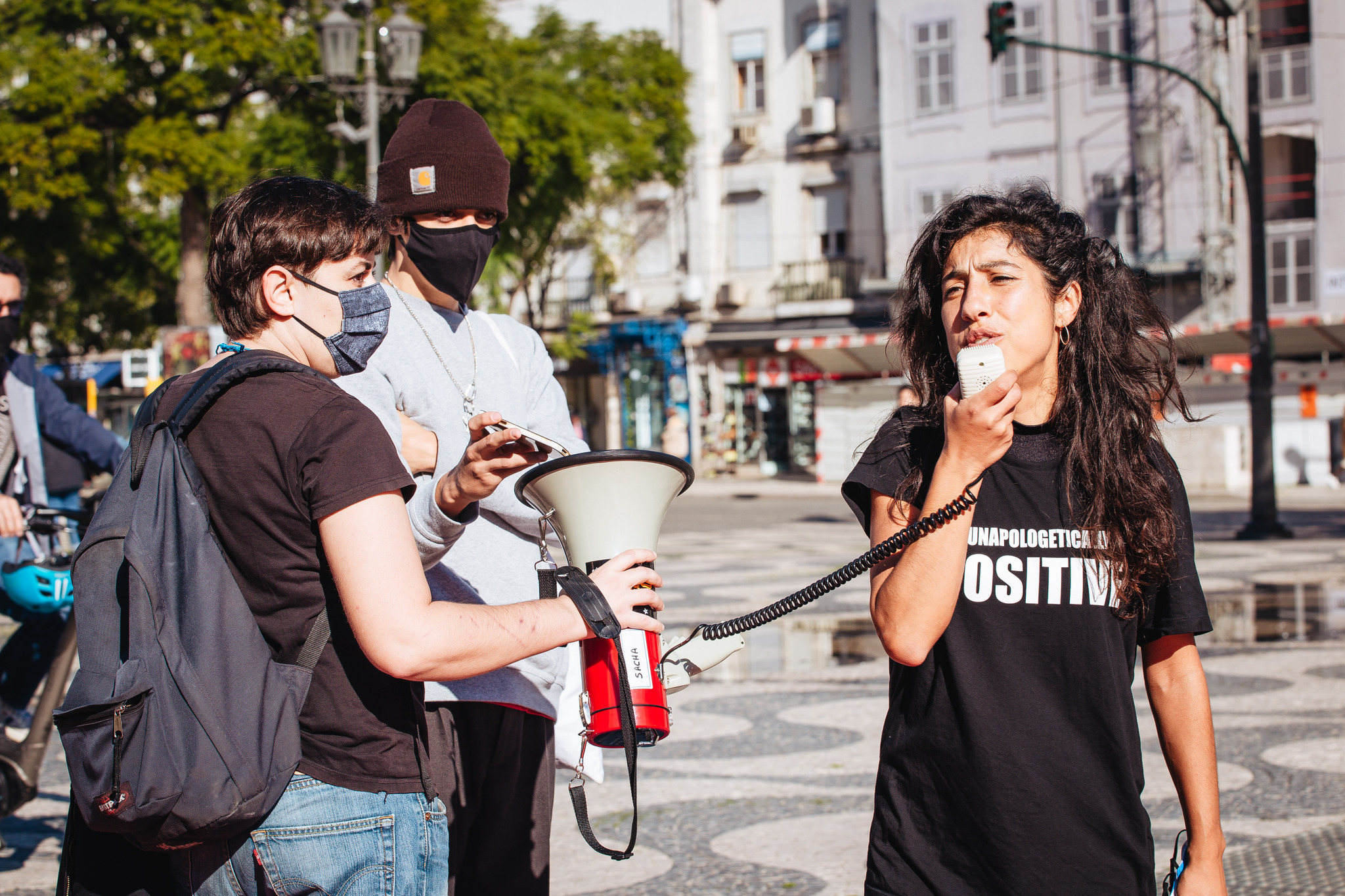
VIRAL public action in Lisboa
Teresa Fabiao © Giulia Ferrari
I’m not doing this work alone. We are in a moment of reconnecting with the importance of the collective.
I come from a personal background of a lot of “resistance” and “fighting”… And now developing work in this area of HIV activism I’m confronted with a belic imaginary.
I’m tired of it. I’m discovering another way for myself. To be aware of the type of relation and language I use in this realm. Because changing the language we use to relate to our body/health changes the way we interact with the world. So, this is a strategy I use to increase awareness and to unlearn and transform the way I relate with the virus.
5. How do you practice self care?
Nature. Being inside nature with no cellphone for a day. Silence. This cleanses my soul.
Dance and movement. Capoeira is my resilience practice. It helps me as a movement metaphor to resist, rebound and turn things upside down to get a new perspective. It’s a kind of medicine for me.
I spent so much time healing in other countries, mostly alone, that now, I’m also reconnecting with the importance of the collective in the healing process.
6. When you feel creatively blocked what are ways you have found to return to the creative source?
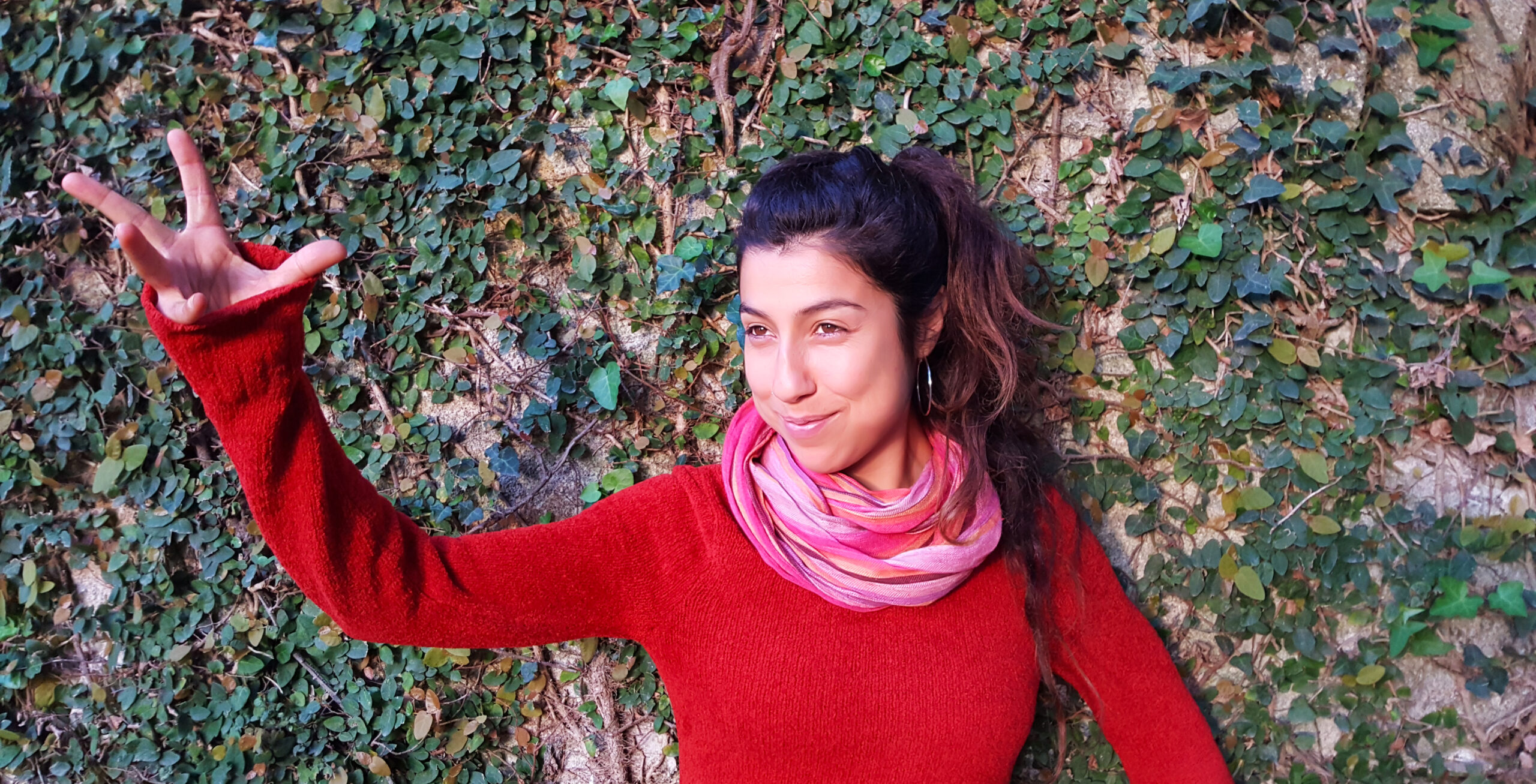
Teresa Fabiao
The first thing that comes to mind is “emptiness” because normally this happens to me when my cup is full.
When I’m always in a “doing” mode there’s a very narrow space for creativity. Going on a retreat helps. At two very specific times I went on a ten day silent retreat. Silence and emptiness in nature gives me space again. A sense of restart.
 NOLAbeings
Multimedia artist Claire Bangser created NOLAbeings as a portrait-based story project that marries...
NOLAbeings
Multimedia artist Claire Bangser created NOLAbeings as a portrait-based story project that marries...
 Data corner: Adobe Suite (create a PDF, social media graphic, presentation, edit a photo and video
Data corner is where you go to work with analytics and top tech skills. It takes on everything from PERL and SQL to Canva and Sprout Social.
Data corner: Adobe Suite (create a PDF, social media graphic, presentation, edit a photo and video
Data corner is where you go to work with analytics and top tech skills. It takes on everything from PERL and SQL to Canva and Sprout Social.
